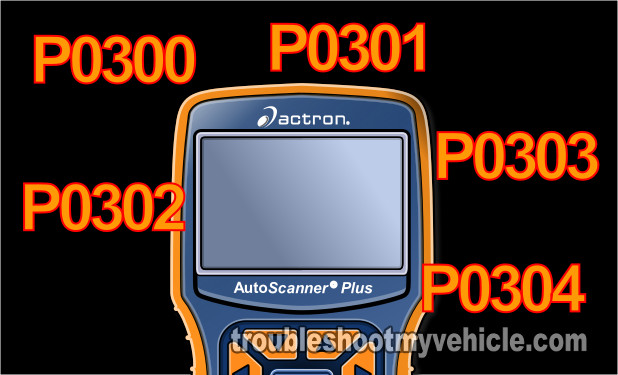
A misfire condition and its corresponding misfire trouble code can result from one of many different components that have failed. This fact could make it seem that troubleshooting its cause is almost impossible.
For example, the misfire code could be caused by a bad Coil-On-Plug (COP) ignition coil, or a bad fuel injector, or in one engine cylinder having very low compression, and the list could go on but I think you get the idea.
The good news is that testing a misfire code, or misfire codes, or a rough idle condition is not that hard and it's something you can do!
In this tutorial, I'm going to explain in some detail the most common causes of misfires and misfire codes (P0300, P0301, P0302, P0303, P0304 -OBD II equipped 1.8L Toyota).
I'm also gonna' offer you a simple diagnostic strategy that will help you get to the bottom of the whatever is causing your Toyota's misfire (rough idle).
Contents of this tutorial:
ES ![]() You can find this tutorial in Spanish here: Cómo Probar Códigos De Falla En Cilindro (1.8L Toyota Corolla) (at: autotecnico-online.com).
You can find this tutorial in Spanish here: Cómo Probar Códigos De Falla En Cilindro (1.8L Toyota Corolla) (at: autotecnico-online.com).
APPLIES TO: This tutorial applies to the following vehicles:
- 1.8L Toyota Celica: 2000, 2001, 2002, 2003, 2004, 2005.
- 1.8L Toyota Corolla: 1996, 1997, 1998, 1999, 2000, 2001, 2002, 2003, 2004, 2005, 2006, 2007, 2008.
- 1.8L Toyota Matrix: 2003, 2004, 2005, 2006, 2007, 2008.
- 1.8L Toyota MR2 Spyder: 2000, 2001, 2002, 2003, 2004, 2005.
- 1.8L Chevrolet Prizm: 1996, 1997, 1998, 1999, 2000, 2001, 2002.
- 1.8L Geo Prizm: 1993, 1994, 1995, 1996, 1997.
- 1.8L Pontiac Vibe: 2003, 2004, 2005, 2006, 2007, 2008.
What Is A Misfire Condition?
In the simplest of terms, a misfiring cylinder is a cylinder that's ‘dead’, because it's missing one of the 3 things it needs for the combustion process to take place. It'll be missing fuel (gasoline), or spark, or air (compression).
So, if just one of the four cylinders is ‘dead’, the engine's idle and performance will be affected for the worse. If your Toyota has two misfiring cylinders, it's not gonna' start and run, and if it does, it's not gonna' go anywhere.
Here are a few other symptoms you'll see with a misfire:
- The check engine light (CEL) will be on.
- One or more misfire codes (P0300-P0304) will be stored in your vehicle's PCM memory (PCM = Powertrain Control Module = fuel injection computer).
- P0300: Random Cylinder Misfire.
- P0301: Cylinder #1 Misfire.
- P0302: Cylinder #2 Misfire.
- P0303: Cylinder #3 Misfire.
- P0304: Cylinder #4 Misfire.
- Sometimes, even tho' your OBD II equipped Toyota is suffering a bonafide misfire, the PCM doesn't set/register any misfire codes (no check engine light either).
- Lack of power upon acceleration.
- Smell of unburned gas exiting the tail pipe.
- Rough idle and may stall.
- Cranks but does not start.
- Will not pass the emissions tests.
- Bad gas mileage.
Although the misfire codes don't tell you what exactly is the cause of the misfire or rough idle condition, there is a way to find out exactly what is causing it.
One of the most important things you need to know, to successfully diagnose a misfire or rough idle condition, is what causes a misfire. Let's go to the next subheading and find out.
What Causes A Misfire Condition?
To get to the meat of the coconut, each cylinder, in your Toyota's 1.8L 4 banger, needs 3 things to create and output power, these 3 are:
- Air.
- Fuel.
- Spark.
It's when a lack of fuel, or a lack of spark, or a lack of air (compression) occurs, in one or several of the 1.8L engine's cylinders, that your Toyota starts to misfire. Let's look into more specifics:
Ignition System: The ignition system is responsible for the production and delivery of spark. The ignition system is usually the culprit behind most misfires.
The usual suspects (that cause a misfire) are:
- Bad spark plugs.
- Carbon tracks on the spark plug and spark plug boot.
- Bad Coil-On-Plug (COP) ignition coil.
- Oil dripping (from the valve cover) onto the spark plugs and spark plug boots (this is a very common problem).
Testing all of the ignition system components is not hard and it doesn't require expensive tools or expensive diagnostic equipment.
The following tutorial will help with what a carbon track is and how it can cause a misfire condition:
- Carbon Tracks Are A Common Cause Of Ignition Misfires (at: easyautodiagnostics.com).
Here's another real life case study worth looking at:
Fuel System: The fuel system is responsible for the delivery of fuel. If fuel is missing from any one specific engine cylinder, it will misfire.
Fuel system problems could include some of the following:
- Bad fuel injectors.
- Broken fuel injector connector (this is a very, very common problem).
- Electrical short in the fuel injector wires that are keeping the fuel injector pulse signal from reaching the fuel injector.
- This is usually the result of human error and after a major mechanical repair where the wiring harness was damaged.
- Bad fuel injection computer not pulsing the fuel injector (this is a very rare condition, but it happens).
- Bad fuel pump.
The following tutorial should be of help:
Engine Mechanical Condition: The pistons and cylinder head valves are the ones that draw air into the engine. Usually all cylinders wear out evenly but every now and then, either thru' lack of maintenance or some mechanical problem, you'll have one or more wear out at an accelerated pace.
To make the long story short, those cylinders (with accelerated wear and tear) to produce a less than average compression value that will cause a misfire condition.
Other issues, that can not be overlooked are vacuum leaks.
Check out this tutorial:
